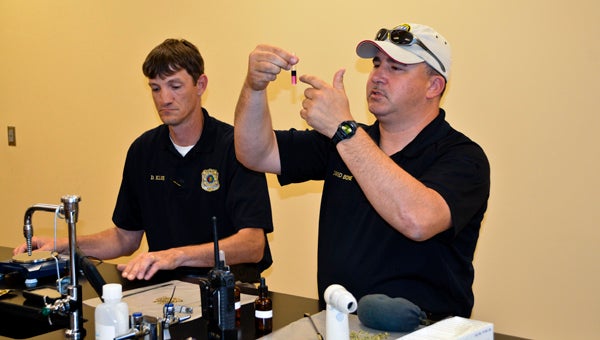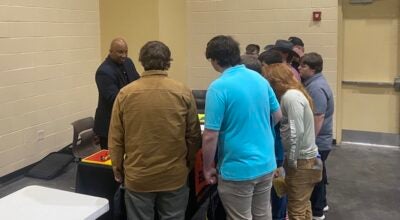CPD demonstrates new in-house drug testing program
Published 11:41 am Thursday, April 25, 2013

Cpl. David Kline and Sgt. David Bone of the Clanton Police Department show how chemicals mixed with real marijuana turn purple during a drug-testing demonstration at Jeff State on Wednesday.
The Clanton Police Department is implementing an in-house drug testing program to expedite the process of identifying marijuana obtained during routine police contact including traffic stops and warranted house searches.
Instead of continuing to send confiscated marijuana off to the Alabama Department of Forensic Science, CPD has partnered with Jefferson State Community College in Clanton to conduct drug-testing procedures in a campus laboratory equipped for such procedures, which require the use of lab materials and potentially hazardous chemicals.
CPD held a demonstration of its marijuana testing Wednesday at Jeff State for local police chiefs, law enforcement officers and prosecutors who wanted to learn about the new process.
CPD has three officers – Sgt. David Bone, Cpl. David Kline and Officer Tera Mayfield – who are trained to perform in-house testing and serve as “expert” witnesses in court regarding drug identification.
Bone, Kline and Mayfield spent 16 hours over the course of two days in training via lecture instruction and practical application in a classroom at Jacksonville State University.
Currently, CPD is only conducting drug tests for its own cases and only those involving marijuana, but Fetner said the department is hoping to eventually help other law enforcement agencies in the county with their testing.
CPD opted for the in-house program because DFS is overloaded with cases from law enforcement agencies, which has increased the wait time for test results to come back.
Lack of adequate state funding is also hindering DFS from processing more cases at a faster pace.
CPD Capt. Neil Fetner said some drug cases the department sends to DFS could take up to 15 months or more to be analyzed. This delay leads to a delay in the department’s cases going through court.
“We get 15–20 marijuana cases per month,” Fetner said. “It was substantial enough that our court docket was being backlogged by the DFS backlog. We’re trying to pick up the slack and handle it on our own in-house.”
Each case takes officers about 15 minutes to test.
Officers perform three different tests on confiscated marijuana, or a confiscated substance believed to be marijuana, from each case: 1) macro – examining the substance with the naked eye; 2) micro – examining the substance using a microscope for magnification; and 3) chemical – mixing chemicals such as chloroform, hydrochloric acid and vanillin, with the substance and observing the color; if the mixture turns purple, the substance is marijuana.
Synthetic marijuana turns yellow when mixed with the same chemicals.
Another characteristic of marijuana that officers look for is the seed. Of 350,000 plant species, marijuana (Cannabis sativa L.) has a seed unlike any other plant.
During testing, officers document every step of the procedure and the chain of custody for the plants in every case.
They use iPads during the visual examination for magnification and photographing of the plants.
“Just by testing everything in-house, we’re going to dispose of marijuana cases in approximately 60 days as opposed to 15–18 months,” Fetner said.
Fetner said CPD is not alone in implementing in-house drug testing; Anniston, Huntsville and Jacksonville police departments conduct in-house testing too.
CPD buys chemicals and materials needed for testing from Fisher Scientific.
CPD paid about $2,000 for its first set of testing supplies and training for the three officers.
“That will get us going and will keep us compliant as long as the chemicals hold out,” Fetner said.
The amount of money CPD will spend per year buying testing supplies will depend on how many cases it has to test.
According to Fetner, CPD is looking at purchasing a handheld device called the Thermo Scientific TruNarc analyzer (TruNarc) that provides rapid identification of suspected narcotics such as cocaine or methamphetamine.
TruNarc would cost about $20,000 to purchase and is not yet established as an official drug-testing device by the state of Alabama.






